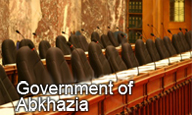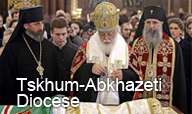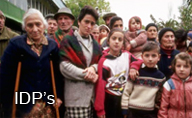Fourth Quarterly Report (October - December 2015) of the Ministry of Foreign Affairs of Georgia on the Human Rights Situation in the Occupied Regions of Georgia
I. Introduction . . . . . . . . . . . . . . . . . . . . . . . . . . . . . . . . . . . . . . . . . . . . . . . . . . . . . . . . . . . . . . . 1
II. Freedom from Torture and Ill-treatment . . . . . . . . . . . . . . . . . . . . . . . . . . . . . . . . . . . . . . . . . . . 3
III. Arbitrary Detention . . . . . . . . . . . . . . . . . . . . . . . . . . . . . . . . . . . . . . . . . . . . . . . . . . . . . . . . . . . . . . 4
IV. Freedom of Movement . . . . . . . . . . . . . . . . . . . . . . . . . . . . . . . . . . . . . . . . . . . . . . . . . . . . . . . . . . . 7
V. Right to Property . . . . . . . . . . . . . . . . . . . . . . . . . . . . . . . . . . . . . . . . . . . . . . . . . . . . . . . . . . . . . . . . . 8
VI. Right to Education in the Native Language . . . . . . . . . . . . . . . . . . . . . . . . . . . . . . . . .. . . .9
VII. Conclusions . . . . . . . . . . . . . . . . . . . . . . . . . . . . . . . . . . . . . . . . . . . . . . . . . . . . . . . . . . . . . . . . . . 11
VIII. Appeal to the International Community . . . . . . . . . . . . . . . . . . . . . . . . . . . . . . . . . . . . . . . . . 13
I. Introduction
Aims of the Report and Methodology Applied
1. This is the fourth quarterly report of the Ministry of Foreign Affairs of Georgia, covering the period of October-December 2015 and aiming at assessing the human rights situation in the occupied regions of Georgia. The Ministry of Foreign Affairs of Georgia will further continue the preparation of such reports on a quarterly basis. This reporting exercise aims to contribute to the provision of regular and updated information to the international community, to states as well as to international inter-governmental and non-governmental organizations, on the human rights situation in the occupied regions of Georgia.
2. As for the applied methodology, this reporting exercise consolidates and assesses existing information from various open sources, national and international, on violations of human rights in the occupied regions of Georgia. Due to limitations on its length, the report does not aim to collect/contain information on all cases of violations of human rights in the occupied regions of Georgia; it aims to consolidate and assess only some of the most known examples of violations. The methodology applied does not provide for the conduct of fact-finding visits to the occupied regions of Georgia, nor to the conduct of interviews. Therefore the methodology applied does not enable this reporting exercise to collect and produce new data on the human rights situation in the occupied regions of Georgia.
Responsibility of the Occupying Power for Human Rights Violations
3. The territories of two regions of Georgia – Abkhazia, Georgia and the Tskhinvali Region, Georgia are occupied by the Russian Federation. The occupation of regions of Georgia by the Russian Federation has been recognized by the international community. The Russian Federation as the occupying power, exercises effective control over Abkhazia, Georgia and the Tskhinvali Region, Georgia. These two regions still remaining under foreign military occupation, constitute above all dangerous “black holes” in verifying human rights violations and holding the violators accountable. The occupying power, exercising effective control, has been preventing numerous international organizations, including humanitarian, from entering those territories.
In the reporting period, Mr. Nils Muižnieks, the Commissioner for Human Rights of the Council of Europe visited Georgia. One of the aims of the visit was to monitor the human rights situation in the occupied territories of Georgia on the ground. Despite some efforts, the Commissioner was not allowed to enter the occupied regions of Abkhazia, Georgia and the Tskhinvali region/South Ossetia, Georgia.
Occupation Line and Installation of Barbed Wire Fences
4. The occupation line along the administrative boundary line (ABL) with Abkhazia and the Tskhinvali Region separates Georgia from its two occupied territories. In 2009 the transfer of the control of the occupation line to the Russian FSB officers puts further restrictions on ethnic Georgians: Russia continues to place undue restrictions on the local population wishing to cross the occupation line that often runs through their orchards, yards, grazing fields, agricultural plots and cemeteries. Since January 2013 the Russian occupation forces intensified the process of the installation of barbed wire fences and other artificial obstacles along the occupation lines in Abkhazia and the Tskhinvali Region (launched back in 2009). Currently, the total length of artificial barriers along the occupation line in Tskhinvali Region is nearly 51 km. Barbed wire fences cover a stretch of more than 12 km in the Abkhazian region. The process of the installation of barbed wire fences by the Russian Federation violates human rights such as the right to free movement, the right to property, the right to family life and the right to education in the native language.
New Wave of so called “Passportisation”
5. It should be noted here that a new wave of so called “passportisation” was underway during the reporting period in the occupied region of Abkhazia.[1] This process is expected to be completed in February 2016. The above process implies issuance of 300 000 new “documents”: 250 000 internal “passports” and 50 000 “residence permits”. All 300 000 documents were already processed in the Russian Federation by “Goznak”.[2] Residents of Gali district fear this so called “passportisation” will further deteriorate their condition.[3] Undoubtedly, this so called “passportisation” may result in a situation where individuals, not eligible to so called new “Abkhaz passports” or so called new “residence permits”, face more complications regarding the right to property and the freedom of movement across the occupation line. On 3rd November 2015, Mr Khajimba declared that he is concerned about a big number of residents of Abkhazia with Georgian citizenship. According to him, the exact number of Georgian citizens residing in Abkhazia should be known and they should adapt to local reality and for that reason a “law on legal status of foreigner” will be adopted in the near future.[4] Ethnic Georgians residing in the occupied region of Abkhazia have all grounds to be concerned about such perspective; status of a “foreigner” can at least restrict their right to property and deteriorate prospects of movement across the occupation line and, in the worst case, become ground for another wave of ethnic cleansing.
Universal Periodic Review (UPR)
6. It is important to note that Georgia’s review under the UPR was held during the reporting period[5], namely in November 2015. The Universal Periodic Review (UPR) is unique mechanism of the UN Human Rights Council and it involves a periodic review of human rights records of all UN member states.[6] The goal of UPR is the improvement of the human rights situation worldwide; to achieve this, the UPR process involves assessments of states’ human rights records and addressing human rights violations wherever they take place.[7]
7. Under the second-cycle of the UPR, Georgia’s review was held on 10 November 2015 during twenty-third session of the Human Rights Council. As part of the UPR review, the government of Georgia prepared and submitted a national report which included a separated section on the human rights situation in the occupied territories of Georgia. It is of paramount importance that during the review, on 10 November 2015, in their speeches twelve member states (Austria, Australia, the UK, Estonia, Lithuania, Latvia, the U.S., Moldova, Poland, Costa Rica, Ukraine and Slovenia) touched upon the issue of human rights violations in Abkhazia, Georgia and the Tskhinvali Region, Georgia or/and stressed the need of access of international human rights monitoring mechanisms to these regions. It should be particularly emphasized that three member states – Lithuania, Ukraine and Moldova issued UPR recommendations to Georgia on the intensification of engagement with the international community for ensuring access of international human rights monitoring mechanisms to Abkhazia, Georgia and the Tskhinvali Region, Georgia.[8] The Government of Georgia accepted all three recommendations among other recommendations.
II. Freedom from Torture and Ill-treatment
8. It is noteworthy that during and after the August War of 2008, numerous cases were reported from the occupied regions of Georgia of torture and ill-treatment.
9. It should be emphasized that during the reporting period[9], namely on 6th November 2015, the UN Human Rights Office of the High Commissioner (OHCHR) published the Report of Mr. Juan E. Mendez, the UN Special Rapporteur on torture and other cruel, inhuman or degrading treatment or punishment on his mission to Georgia. The report specifies that the Special Rapporteur attempted to visit Georgia’s regions of Abkhazia and the Tskhinvali region, however the authorities that exercise control over these regions denied him access.[10]
10. Several cases were noted during the reporting period on violations of the right to freedom from torture and ill-treatment. For example information available in the Georgian media and other open sources suggest the following cases that are listed below.
11. On 7th October 2015, several villages of “lower zone” of Gali district were raided by so called “Special Forces”. In the village of Otobaia, Gali district two youngsters were detained and were taken to so called “police unit”. One of the detainees was beaten during the detention.[11]
12. On 8th October 2015, a resident of the village of Nabakevi, Gali district was severely beaten by the Russian FSB officers for so called “illegal border crossing” of the occupation line. Later the victim was transported to hospital of the village for the medical aid. In the hospital, the health condition of the victim was assessed as severely damaged.[12]
13. On 6th November 2015, a resident of the village of Otobaia, Gali district crossed the occupation line while the operating crossing point was closed. The resident was returning from the Zugdidi hospital, located on the territory controlled by the central government of Georgia. The resident was detained and severely beaten by the Russian FSB officers for so called “illegal border crossing”. After beating, the victim was abducted by the same Russian FSB officers. Information about the whereabouts of the victim was missing for several days. According to some eyewitnesses, the blood stains were visible on the scene where the victim was beaten.[13]
III. Arbitrary Detention
14. Between 2009 and March 2015, in total 2481 people were detained by the Russian FSB officers for so called “illegal border crossing”; 1641 were detained along the occupation line in the Abkhazian region and 840 in the Tskhinvali region.[14] In 2015 503 people were detained by the Russian FSB officers for so called “illegal border crossing”; 341 were detained along the occupation line in the Abkhazian region and 162 in the Tskhinvali region.[15] However, according to information of the Press Office of the Russian FSB Border Guards, 2400 people were detained in 2015 by the Russian FSB officers for so called “illegal crossing of the Georgian-Abkhazian state border”.[16]
15. The Russian FSB officers regularly carry out arbitrary detention for so called “illegal border crossing” along the occupation line. In most cases detention is followed by fines and later release. Detention period can last several days or several months, in some cases several years. Numerous cases have been reported during the reporting period[17] on arbitrary detention in the occupied regions. For example, information available in the Georgian media and other open sources report the following cases that are listed below.
16. On 13th October 2015, two shepherds from the village of Tsitelubani, Gori district were detained by the Russian FSB officers for so called “illegal border crossing”. Two shepherds were in pastures along the occupation line. However two shepherds did not cross the occupation line; the Russian FSB officers entered the territory controlled by the central government and detained them. According to members of their families, shepherds used to visit the area everyday because it is on the territory controlled by the central government of Georgia.[18]
17. On 17th October 2015, two residents of the village of Dvani, Kareli district were detained by the Russian FSB officers for so called “illegal border crossing”. Two men were harvesting the crops in their orchards when the Russian FSB officers detained them. According to local residents, the detainees did not cross the occupation line; the Russian FSB officers entered the territory controlled by the central government and detained them.[19]
18. On 21st October 2015, a woman and her son-in-law, both residents of the village of Artsevi, Kareli district were detained by the Russian FSB officers along the occupation line with Tskhinvali region. A house of the son-in-law is located in the same village but on the other side of the occupation line. A woman handed to her son-in-law, who was on the other side of the barbed wire fence, a housekeeping unit. This served the reason for their detention.[20]
19. On 23rd October 2015, three residents of the village of Sakorintlo, Kaspi district were detained by the Russian FSB officers for so called “illegal border crossing”. All three of them were in pasture fields for livestock grazing. According to the eyewitnesses, the detainees did not cross the occupation line, but the Russian FSB officers invaded into the territory controlled by the central government and detained them.[21]
20. On 29th October 2015, the Russian FSB officers detained three journalists of online media in the village of Tagiloni, Gali district for so called “illegal border crossing”. According to the eyewitnesses, the journalists visited the village of Tagiloni in order to collect information on local social conditions: they were interviewing locals. Suddenly armored military vehicle with the Russian FSB officers arrived and detained all three journalists. They were transported to the direction of the Russian military base.[22]
21. On 2nd November 2015, a citizen of Georgia was detained by the Russian FSB officers along the occupation line with Abkhazia for so called “illegal border crossing”. Criminal charges were brought against the detainee.[23]
22. On 20th November 2015, a father and his son, both residents of the village of Kere, Gori district were detained by the Russian FSB officers for so called “illegal border crossing”. Both persons were in pasture fields for livestock grazing. According to local residents, two detainees did not cross the occupation line, but the Russian FSB officers invaded into the territory controlled by the central government and detained them.[24]
23. On 23rd November 2015, three residents of the village of Adzvi, located along the occupation line with Tskhinvali region, were detained by the Russian FSB officers for so called “illegal border crossing”. Three people were detained when they approached local church for religious ritual. All three detainees were transported to the direction of Tskhinvali. According to local residents, the Russian FSB officers warned all other residents of the adjacent villages not to approach church due to the occupation line. Local residents complain that there are no barbed wire fences separating the church from the territory controlled by the central government and that the installed signpost marking so called “state border” does not explicitly prohibit the approaching of the church and its premises.[25]
24. On 22nd December 2015, two elderly, one of them 80 year old woman, both of them residents of the village of Chvrinishi, Kareli district were detained by the Russian FSB officers for so called “illegal border crossing”. According to local residents, the detention took place nearby the occupation line.[26]
25. On 28th December 2015, 20 ethnic Georgians were detained in the village of Nabakevi, Gali district by the Russian FSB officers for so called “illegal border crossing”. Among 20 detainees, one was a nine year old child. Despite numerous requests, father of the detained child was refused to see his detained child.[27]
IV. Freedom of Movement
26. People are regularly detained by the Russian FSB officers for so called “illegal border crossings” while the operating crossing points along the occupation line allow crossings only to individuals having one of the types of “documents” recognized by the occupying power and based on vague criteria as to the validity of these documents.[28] Numerous cases were reported during the reporting period on violations of the right to freedom of movement.
27. According to information of the Press Office of the Russian FSB Border Guards, throughout the year 2015, that includes three months of the reporting period[29], the Russian FSB officers identified more than 7000 people wishing to cross so called “the Georgian-Abkhazian state border” without “proper documentation”.[30] The list of “documents” that are acceptable was published on 15 June 2015 by the Russian FSB Border Guards in the Russian language.[31] Those unable to present those documents or show up at the crossing point out of working hours, are denied the right to cross, often leading to problems among those locals, including children and women, seeking urgent medical treatment.
28. The process of the installation of barbed wire fences by the Russian Federation along the occupation line violates human rights including the right to freedom of movement. Mr Kęstutis Jankauskas, Head of EUMM Georgia spoke at First Meeting of the EU-Georgia Parliamentary Association Committee, held on 3-4 November 2015 in Tbilisi. According to Mr Jankauskas, in region of Abkhazia installation of barbed wire fences almost doubled in order to restrict freedom of movement along the uncontrolled segments of administrative boundary line (ABL). Mr Jankauskas stated that some difficult issues may arise in the nearest future related to the interpretation by the Russian Federation of various maps. According to Jankauskas problems were faced when pupils were prevented from crossing the line for attendance of school.[32]
29. It is noteworthy that the ongoing construction by government of Georgia of multifunctional medical centre in the village of Rukhi, located in 5 kilometers away from the occupation line with Abkhazia, served as a reason for worrisome statements made in Abkhazia region on possible future introduction of visa regime for ethnic Georgians living in Abkhazia region or on complete closure of administrative boundary line.[33] It should be noted that the system of health care of Georgia operates a program that ensures free of charge medical treatment of people living in the occupied regions of Georgia. According to existing data, hundreds of residents from the occupied region of Abkhazia benefited from this medical system on the territory controlled by the central government.
30. On 23rd November 2015, residents of the of Adzvi, located along the occupation line with Tskhinvali region, were banned by the Russian FSB officers to visit the village church. The Russian FSB officers warned the residents of the village not to approach the church due to the occupation line. The local population of the village was always able to visit the church without any restriction. According to a local resident “a group of villagers was planning to visit the church, however the Russian FSB officers in masks stopped us and forced to go back.”[34]
V. Right to Property
31. The issue of homes and property lost during the conflicts in Georgia remains unsolved. For years, the right to property has been subject to systematic and gross violations in the occupied regions of Georgia; hundreds of houses of ethnic Georgians were burned/destroyed deliberately during and after the August War of 2008. The situation with regard to the right to property remained the same between October and December 2015. Numerous sources suggest continuing violations of the rights to property during the reporting period. Information available in the Georgian media and other open sources report the following:
32. According to information of the Press Office of the Russian FSB Border Guards, throughout the year 2015, that includes three months of the reporting period[35], the Russian FSB officers seized 1 100 kilograms of hazelnut from so called “trespassers of the Georgian-Abkhazian state border”.[36] During the reporting period, the Russian FSB officers were collecting so called “customs tariffs” over hazelnut transported across the occupation line.[37] It should be noted that hazelnut constitutes significant source of income for some people living in the occupied region of Abkhazia, in particular, for the most of the local residents of Gali district. Many residents of the occupied region of Abkhazia try to cross the occupation line in order to transport and sell wholesale the harvested hazelnut in Zugdidi, the territory controlled by the central government of Georgia, where the price is much higher than offered by local markets in the occupied region.
33. On 23rd October 2015, the Russian FSB officers entered pasture fields of the village of Sakorintlo, Kaspi district located on the territory controlled by the central government of Georgia and detained 3 local residents and abducted 10 units of domestic cattle belonging to several families of the village.[38]
34. On 31st December 2015, Russian militaries deployed additional troops in Gali in order to strengthen control of the occupation line adjacent to the villages of “upper zone” and “lower zone” of Gali district. According to the disseminated information, newly deployed the Russian FSB officers have the list of Georgian families using the Georgian mobile network operators and they were tasked to seize mobile phones form these families. According to Gali residents “the situation on the ground is horrible. All local residents who were transporting products to Zugdidi market were detained by Russian militaries and all products were seized from them. Some of the detainees were later released and some were transported to the Russian military base.”[39]
VI. Right to Education in the Native Language
35. In the Gali district there are 31 schools. By the end of the academic year 2014-2015 there were 4, 459 pupils and 918 employees in these 31 schools; from 4, 459 pupils, 4, 351 i.e. 97.57 per cent, were ethnically Georgian and from 918 employees, 91.78 per cent were ethnically Georgian.[40] From 31 schools only 11 schools, all of which are in “lower zone” of Gali district, had the status of Georgian schools until the end of the academic year 2014-2015 and subjects were taught in the Georgian language.[41] As for the remaining 20 schools in Gali district, several years ago all of them were transformed to the Russian schools.[42]
36. From the beginning of September of the academic year 2015-2016, drastic changes were made in the curriculum of these 11 schools in “lower zone” of Gali district, namely now all subjects are taught in the Russian language in the first four grade classes i.e. in first grade, second grade, third grade and fourth grade classes.[43] The policy, if continued for 6 years, will result in gradual replacement of the Georgian curriculum with the Russian curriculum for all grades in these 11 schools of “lower zone” of Gali district. The Russian curriculum means that the Russian textbooks, licensed by the Ministry of Education and Science of the Russian Federation and published in the Russian Federation, are used for the teaching.[44] In these classes only 1 hour per week is allocated for learning the Georgian language as a foreign language.[45]
37. According to the information disseminated on 20 October 2015, there is a grave situation in Gali, namely children are literally forced to learn the Russian language; pupils of 11 schools in “lower zone” of Gali district have difficulties in learning subjects in the Russian language. According to parents of the schoolchildren, since these schools used to be Georgian schools until the academic year 2014-2015, pupils, particularly of third and fourth grades, lack sufficient knowledge of the Russian language and they are unable to learn subjects in the Russian language.[46] The problems exist with regard to pupils of tenth grades: graduation exams in 2016 will be in the Russian language.[47]
38. Due to the complications with learning subjects in Russian, a number of parents made the decision on termination of attendance by their schoolchildren of the schools with newly introduced Russian curriculum.[48] Some families were forced to migrate from Gali district to the territory controlled by the central government in order to have access for their children of the Georgian language schools.[49] After the end of academic year 2014-2015, 55 schoolchildren changed schools and moved to schools located in the territory controlled by the central government; these are predominantly pupils of the second, third and fourth grades.[50] According to some parents, pupils cannot comprehend subjects such as mathematics and nature in a foreign (Russian) language.[51]
39. According to the information disseminated on 6th November 2015, decision had been made to force all teachers of the Georgian language in Gali district to pass a special exam in the Russian language; in case they fail, they will be dismissed.[52] According to some reports, schoolchildren and their teachers in Gali are subjected to regular and arbitrary control; their bags are forcefully checked to avoid the Georgian language materials in schools.[53]
VII. Conclusions
40. It can be concluded that the situation described in the occupied regions of Georgia with regard to freedom of torture and ill treatment and examples provided for the reporting period constitute infringements on freedom from torture and ill-treatment and therefore are violations of Article 7 of the International Covenant on Civil and Political Rights (ICCPR); Article 5 of the Universal Declaration of Human Rights (UDHR); Article 3 of the European Convention on Human Rights (ECHR); and the OSCE commitments[54].
41. It can be concluded that the situation described in the occupied regions of Georgia with regard to arbitrary detention and examples provided for the reporting period constitute arbitrary detention and therefore violations of Article 9 of the International Covenant on Civil and Political Rights (ICCPR); Article 3 of the Universal Declaration of Human Rights (UDHR); Article 5 of the European Convention on Human Rights (ECHR); and relevant provisions of the OSCE commitments[55].
42. It can be concluded that the situation described in the occupied regions of Georgia with regard to freedom of movement and examples provided for the reporting period constitute violations of the right to freedom of movement, namely of Article 12 of the International Covenant on Civil and Political Rights (ICCPR); Article 13 of the Universal Declaration of Human Rights (UDHR); Article 2, Protocol No. 4 of the European Convention on Human Rights (ECHR); and the OSCE freedom of movement commitments[56].
43. It can be concluded that the situation described in the occupied regions of Georgia with regard to right to property and examples provided for the reporting period violate the right to property, namely Article 17 of the Universal Declaration of Human Rights (UDHR); Article 1, Protocol No. 1 of the European Convention on Human Rights (ECHR); and the OSCE commitments[57].
44. It can be concluded that the situation described in the occupied regions of Georgia with regard to education in the native language[58] and examples provided for the reporting period constitute violations of the right to education in one’s native language and therefore violations of Article 26 (read in conjunction with Article 2) of the Universal Declaration of Human Rights (UDHR); Article 2, Protocol No. 1 of the European Convention on Human Rights (ECHR); Article 28 (read in conjunction with paragraph 1 of Article 2) of the UN Convention on the Rights of the Child; and relevant provisions of OSCE commitments[59].
VIII. Appeal to the International Community
45. The Ministry of Foreign Affairs of Georgia appeals to the international community, states as well as international intergovernmental and non-governmental organizations:
to continue recognizing extensively and widely the occupation of the territories of Georgia by the Russian Federation;
to continue calling on the Russian Federation to bear responsibility for human rights violations on the occupied regions of Georgia;
to continue calling on the Russian Federation to stop placing and remove barbed wire fences and other artificial obstacles and banners along the occupation line;
to take additional measures in order to monitor and report on the human rights situation in the occupied regions of Georgia, more specifically, the Ministry of Foreign Affairs of Georgia appeals to:
i) the Office of the United Nations High Commissioner for Human Rights (OHCHR) to take additional measures in order to regularly address and assess the human right situation in Abkhazia and Tskhinvali region of Georgia;
ii) the UN Human Rights Council’s Special Procedure Mandate holders to take additional measures in order to address and report on the human right situation in Abkhazia and Tskhinvali region of Georgia;
iii) the Commissioner for Human Rights of the Council of Europe to take additional measures in order to address and report on the human right situation in Abkhazia and Tskhinvali region of Georgia;
iv) the OSCE and its autonomous institutions, namely the Office for Democratic Institutions and Human Rights (ODIHR) and the Office of the High Commissioner on National Minorities (HCNM) to find ways for monitoring the human rights situation in Georgia’s occupied regions. Such steps could, inter alia, include undertaking a follow-up mission to the occupied regions of Georgia and preparing a report on the status of the implementation of the recommendations contained in the ODIHR/HCNM 2008 Report on “Human Rights in the War Affected Areas following the Conflict in Georgia”.
to continue calling on the Russian Federation to allow a) access of the international human rights monitoring mechanisms to the occupied regions of Georgia; b) access of the relevant missions of international organizations (e.g. EUMM), including humanitarian organizations, to the occupied regions of Georgia through legal routes;
to continue and intensify condemning violations of human rights such as freedom of movement; freedom from torture and ill-treatment; the right to liberty; the right to property and the right to receive education in the native language in the occupied regions of Georgia.
[1] Available at <http://www.apsnypress.info/news/pervaya-partiya-novykh-pasportov-grazhdanina-abkhazii-pribyla-v-respubliku/>
[2] "Goznak" is Federal State Unitary Enterprise in the Russian Federation that is 100% government-owned and is responsible for the manufacturing of banknotes, coins, stamps, ID-cards. Available at <http://goznak.ru/en/about/today/>
[3] Weekly press review on the human rights violations and current events in Abkhazia, prepared by the Justice Department of Georgia’s Autonomous Republic of Abkhazia, between 12 October and 16 October 2015, p. 5.
[4] Weekly press review on the human rights violations and current events in Abkhazia, prepared by the Justice Department of Georgia’s Autonomous Republic of Abkhazia, between 2 November and 8 November 2015, p. 4.
[5] October-December 2015.
[6] Basic Facts about the UPR. “OHCHR”. Available at <http://www.ohchr.org/EN/HRBodies/UPR/Pages/BasicFacts.aspx>
[7] Basic Facts about the UPR. “OHCHR”. Available at <http://www.ohchr.org/EN/HRBodies/UPR/Pages/BasicFacts.aspx>
[8] See Draft report of the Working Group on the Universal Periodic Review, Georgia. Human Rights Council, 23rd Session, Geneva, 2-13 November 2015.
[9] October-December 2015.
[10] Report of the UN Special Rapporteur on torture and other cruel, inhuman or degrading treatment or punishment on his mission to Georgia. Human Rights Council, Thirty-first session. 6 November 2015, paragraph 4. Available at < http://www.ohchr.org/EN/Issues/Torture/SRTorture/Pages/SRTortureIndex.aspx>
[11] Weekly press review on the human rights violations and current events in Abkhazia, prepared by the Justice Department of Georgia’s Autonomous Republic of Abkhazia, between 5 October and 11 October 2015, p. 8.
[12] Occupants Severely Beaten a Resident of Gali District. “Abkhazeti Info”, 8 October 2015, available at <http://abkhazeti.info/abkhazia/2014/1444365093.php>
[13] Exclusive: Russian Militaries first beaten and then abducted Georgian. “Timer”, 8 November 2015. Available at <http://www.timer.ge/eqskluzivirusma-samkhedroebma-qarthveli-jer-sastikad-scemes-shemdeg-ki-gaitaces/>
[14] Georgian Citizens Detained by Russian Occupational Troops in 2015”, Institute for Development of Freedom of Information (IDFI). Available at <https://idfi.ge/en/georgian-citizens-detained-by-russian-occupational-troops-in-2015>
[15] Georgian Citizens Detained by Russian Occupational Troops in 2015”, Institute for Development of Freedom of Information (IDFI). Available at <https://idfi.ge/en/georgian-citizens-detained-by-russian-occupational-troops-in-2015>
[16] In 2015 the Russian FSB Border Guards detained 2400 people for illegal crossing of the Georgian-Abkhazian border. 22 December, 2015. Available at <http://abkhazinform.com/item/2831-s-nachala-2015-goda-rossijskie-pogranichniki-zaderzhali-bolee-2400-chelovek-za-narushenie-pravil-peresecheniya-gruzino-abkhazskoj-granitsy>
[17] October-December 2015.
[18] Two Shepherds Detained on the Territory of Tsitelubani. “IPN”. 12 October 2015. Availabel at <http://www.interpressnews.ge/ge/konfliqtebi/349400-sofel-tsithelubnis-teritoriaze-ori-mtsyemsi-daakaves.html>
[19] Two More Georgian Arrested in Dvani. “First Channel”. 17 October 2015. Available at <http://1tv.ge/ge/news/view/109297.html>
[20] Situation at the Occupation Line: two residents of Artsevi detained. ”First Channel”. 21 October 2015. Available at <http://1tv.ge/ge/news/view/109559.html>
[21] In the Village of Sakorintlo three People were Detained. “IPN”. 23 October 2015. Available at <http://www.interpressnews.ge/ge/konfliqtebi/351029-sakorinthlos-ganapiras-sheiaraghebulma-pirebma-sami-adgilobrivi-daakaves.html?ar=A>
[22] Journalists of Online Media were Detained in the Village of Tagiloni, Gali District. “Smo News”. 29 October 2015. Available at <http://www.smoge.org/გალის-რაიონის-სოფელ-თაგი-2/>
[23] A Citizen of Georgia Detained in the Occupied Abkhazia. “Kvira”. 2 November 2015. Available at <http://kvira.ge/%E1%83%9D%E1%83%99%E1%83%A3%E1%83%9E%E1%83%98%E1%83%A0%E1%83%94%E1%83%91%E1%83%A3%E1%83%9A-%E1%83%90%E1%83%A4%E1%83%AE%E1%83%90%E1%83%96%E1%83%94%E1%83%97%E1%83%A8%E1%83%98-%E1%83%A1%E1%83%90%E1%83%A5/>
[24] Father and Son Detained. “Radio Liberty”. 20 November 2015. Available at <http://www.radiotavisupleba.ge/content/dakaveba-saokupatsio-khaztan/27376806.html>
[25] Three People Detained near Adzvi. “IPN”. 23 November 2015. Available at <http://www.interpressnews.ge/ge/konfliqtebi/355430-sofel-adzvthan-sami-piri-daakaves.html?ar=A>
[26] Two Elderly Abducted from the Occupation Line still in Detention. “First Channel”. 22 December 2015. Available at <http://1tv.ge/ge/news/view/113785.html>
[27] Occupants Detained 20 Georgians in the Village of Nabakevi. “Abkhazeti info”. 28 December 2015. Available at <http://abkhazeti.info/abkhazia/2014/1451371603.php>; Russian occupants detained 20 Georgians, including a 9-year-old boy in Nabakevi. “Rustavi 2”, 29 December 2015. Available at <http://rustavi2.com/en/news/35404>
[28] Consolidated Report on the Conflict in Georgia, Council of Europe (November 2014 - March 2015), 22 April 2015, SG/Inf (2015) 18, paragraph 44.
[29] October-December 2015.
[30] In 2015 the Russian FSB Border Guards detained 2400 people for illegal crossing of the Georgian-Abkhazian border. 22 December, 2015. Available at <http://abkhazinform.com/item/2831-s-nachala-2015-goda-rossijskie-pogranichniki-zaderzhali-bolee-2400-chelovek-za-narushenie-pravil-peresecheniya-gruzino-abkhazskoj-granitsy>
[31] Available at <http://abkhazinform.com/item/1356-pogranuppravlenie-fsb-rf-v-abkhaziiinformiruet-grazhdan-o-dokumentakh-pozvolyayushchikhperesekat-gruzino-abkhazs>
[32] Preparation of Military Unites of so called South Ossetia and Abkhazia much more Intensified then in the Past. “Pirweli”. 4 November 2015. Available at <http://pia.ge/show_news.php?id=53073>
[33] Temur Nardaia is not excluding the full Closure of Georgian-Abkhazian Border. “Nuzhnaya Gazeta”. 9 November 2015. Available at <http://abh-n.ru/timur-nadaraya-ne-isklyuchaet-polnogo-zakrytiya-granicy-po-reke-ingur/>
[34] Three People Detained near Adzvi. “IPN”. 23 November 2015. Available at <http://www.interpressnews.ge/ge/konfliqtebi/355430-sofel-adzvthan-sami-piri-daakaves.html?ar=A>
[35] October-December 2015.
[36] In 2015 the Russian FSB Border Guards detained 2400 people for illegal crossing of the Georgian-Abkhazian border. 22 December, 2015. Available at <http://abkhazinform.com/item/2831-s-nachala-2015-goda-rossijskie-pogranichniki-zaderzhali-bolee-2400-chelovek-za-narushenie-pravil-peresecheniya-gruzino-abkhazskoj-granitsy>
[37] Available at <http://www.livepress.ge/ka/site/news/12927>
[38] Occupants Abducted 3 People and 10 Domestic Cattle from Kaspi District. “NewPost”. 23 October 2015. Available at <http://www.newposts.ge/?l=G&id=90087>
[39] Russian Occupants Deployed Additional Troops in Gali for so called Border Control.”NewPost”. 31 December 2015. Available at <http://www.newposts.ge/?id=95969>
[40] Weekly press review on the human rights violations and current events in Abkhazia, prepared by the Justice Department of Georgia’s Autonomous Republic of Abkhazia, between 27 July and 2 August 2015.
[41] The Realm of the Possible - Finding ways forward in the Georgian-Abkhaz context: People in the Gal/I region, Conciliation Resources, July 2015, page 10. Available at < http://www.c-r.org/downloads/CR_The-Realm-of-the-possible_Gal-i_43_webEn.pdf >; Report of the Year 2014 of the Public Defender of Georgia on the Situation of Rights of the Population Affected by the Conflicts, 5 June 2015, page 26. Available at <http://www.ombudsman.ge/en/news/reports-on-the-human-rights-situation-of-conflict-affected-population-and-internally-displaced-persons-in-georgia.page>
[42] “A special Report of the Public Defender of Georgia – The Right to Education in Gali District: New Developments and Challenges of the Academic Year of 2015-2016”, Public Defender of Georgia, October 2015, page 5. Available at <https://drive.google.com/file/d/0B9BM3M8hbgAUNFE3RndlaXc2dFU/view?pref=2&pli=1>
[43] “A special Report of the Public Defender of Georgia – The Right to Education in Gali District: New Developments and Challenges of the Academic Year of 2015-2016”, Public Defender of Georgia, October 2015, page 5. Available at <https://drive.google.com/file/d/0B9BM3M8hbgAUNFE3RndlaXc2dFU/view?pref=2&pli=1>
[44] “A special Report of the Public Defender of Georgia – The Right to Education in Gali District: New Developments and Challenges of the Academic Year of 2015-2016”, Public Defender of Georgia, October 2015, page 4. Available at <https://drive.google.com/file/d/0B9BM3M8hbgAUNFE3RndlaXc2dFU/view?pref=2&pli=1>
[45] Weekly press review on the human rights violations and current events in Abkhazia, prepared by the Justice Department of Georgia’s Autonomous Republic of Abkhazia, between 31 August and 4 September 2015.
[46] Children in Gali are Forced to Learn in Russian. “Timer”, 20 October 2015. Available at <http://www.timer.ge/%E1%83%92%E1%83%90%E1%83%9A%E1%83%A8%E1%83%98-%E1%83%A0%E1%83%A3%E1%83%A1%E1%83%A3%E1%83%9A%E1%83%98%E1%83%A1-%E1%83%90%E1%83%A0%E1%83%9B%E1%83%AA%E1%83%9D%E1%83%93%E1%83%9C%E1%83%94-%E1%83%91/>
[47] Georgian Teachers and Schoolchildren in Abkhazia will need to Pass Exams in Russian. 6 November 2015. Available at <http://www.newposts.ge/?l=G&id=91376-%E1%83%90%E1%83%A4%E1%83%AE%E1%83%90%E1%83%96%E1%83%94%E1%83%97%E1%83%98,%20%E1%83%92%E1%83%90%E1%83%9C%E1%83%90%E1%83%97%E1%83%9A%E1%83%94%E1%83%91%E1%83%90>
[48] Weekly press review on the human rights violations and current events in Abkhazia, prepared by the Justice Department of Georgia’s Autonomous Republic of Abkhazia, between 9 November and 16 November 2015, p.7.
[49] Georgians have Commenced to Leave Gali. “Marshal Press”. 13 November 2015. Available at <http://marshalpress.ge/?p=15176>
[50] Georgians have Commenced to Leave Gali. “Marshal Press”. 13 November 2015. Available at <http://marshalpress.ge/?p=15176>
[51] Georgians have Commenced to Leave Gali. “Marshal Press”. 13 November 2015. Available at <http://marshalpress.ge/?p=15176>
[52] Georgian Teachers and Schoolchildren in Abkhazia will need to Pass Exams in Russian. ^ November 2015. Available at <http://www.newposts.ge/?l=G&id=91376-%E1%83%90%E1%83%A4%E1%83%AE%E1%83%90%E1%83%96%E1%83%94%E1%83%97%E1%83%98,%20%E1%83%92%E1%83%90%E1%83%9C%E1%83%90%E1%83%97%E1%83%9A%E1%83%94%E1%83%91%E1%83%90>
[53] Georgians have Commenced to Leave Gali. “Marshal Press”. 13 November 2015. Available at <http://marshalpress.ge/?p=15176>
[54] The Vienna Concluding Document (1989) prohibits torture and other cruel, inhuman or degrading treatment or punishment. Paragraph 23.4; The Paris Document (1990) also prohibits torture and other cruel, inhuman or degrading treatment or punishment; the Istanbul Charter for European Security commits to “eradicating torture and other cruel, inhuman or degrading treatment or punishment throughout the OSCE area.” Paragraph 21.
[55] The Vienna Concluding Document (1989) provides for ensuring that no one is subjected to arbitrary arrest, detention or exile. Paragraph 23.1; According to the Moscow Document (1991) “no one will be deprived of his liberty except on such grounds and in accordance with such procedures as are established by law”. Paragraph 23.1 (i).
[56] According to paragraph 33 of the Moscow Document (1991), the OSCE participating States are obliged to remove all restrictions with regard to travel within the territory of a State and with regard to residence for those entitled to permanent residence within the territory of a State. And according to paragraph 20 of the Vienna Concluding Document (1989), the OSCE participating States are committed to secure the right of everyone to freedom of movement and residence within the borders of a State.
[57] The OSCE commitments impose obligation on states to ensure that everyone has the right to enjoy property and that no one may be deprived of properly except under conditions provided for by law. Moscow Document (1991), paragraph 24; Copenhagen Document (1990), paragraph 9.6.
[58] The right to receive education in the native language is widely recognized under international law. Languages and the Realization of the Right to Education, UNESCO. For example, under the ECHR, the right to education implies the right to be educated in the national language. Belgian Linguistic Case, Judgment of 23 July 1968, para 3 (A.6 (1968), p.31). In Cyprus v. Turkey the Court stated that the abolishing the facility for Greek-Cypriot children in Northern Cyprus for pursuing a secondary education in the Greek language violated Article 2 of the ECHR. Judgment of 10 May 2001, paragraphs 273-280.
[59] According to paragraph 63 of the Vienna Document (1989), all shall have access to “the various types and levels of education without discrimination as to race, colour, sex, language, religion, political or other opinion, national or social origin, property, birth or other status.”






















